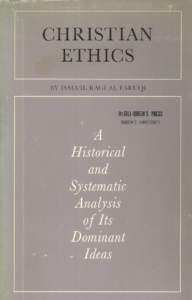
Faruqi sharpens his critique of the Christian doctrine of God by asserting that Christianity,
eternalizes the revelation of Christ not as a system of ideas that may be God’s will, but as the Christ-event. . . Christianity consistently argues that Christ (i.e. his significance) is not the will of God, nor his command, nor His idea, but God Himself, or rather God co-eternal with God. Christianity is driven to this deifying hypostasis because it eternalizes a real person and a real event. A person may be co-eternal with God, but not derivatively eternal without violating the law of identity. But to violate the law of identity in this instance is to lapse into polytheism (CE 228).
Unfortunately for Faruqi, his objection is only hitting at theological strawmen since Christians are not asserting that Christ is identical with God without remainder in his incarnate state. Indeed, Faruqi’s objection is self-defeating. If he accuses Christianity of eternalizing a historical person, his religious philosophy commits the same logical move by eternalizing the Quran which was revealed to its messenger in 7th century Arabia. Continue reading “A Critique of Ismail Faruqi’s Metareligion and Ethical Analysis of Christianity. Part 3/3”


